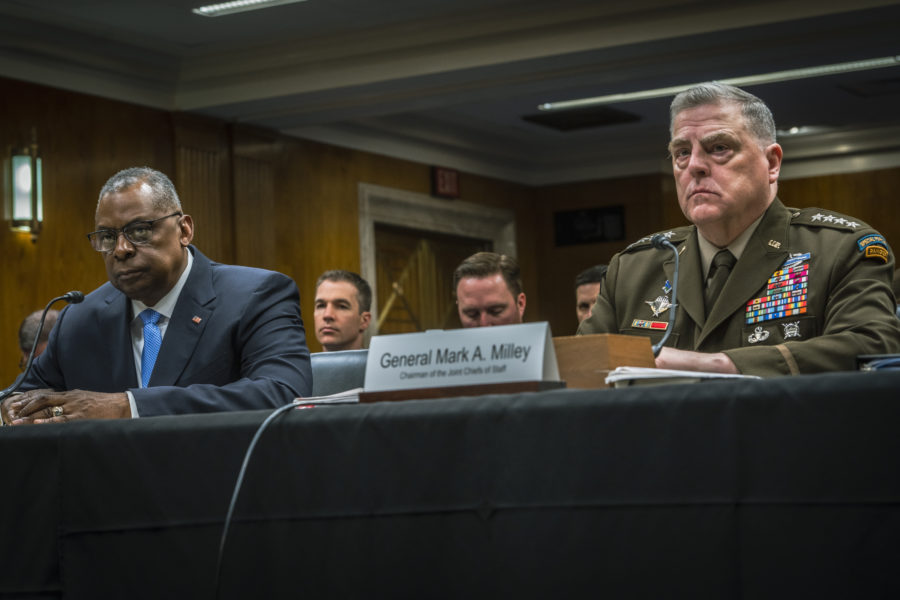With the clock ticking on negotiations over the U.S. debt ceiling, Pentagon and Air Force leaders warned that a default on the national debt would “embolden” China, devastate the Pentagon budget, and put troops’ pay at risk.
Treasury Secretary Janet Yellen has said lawmakers have until June 1 to raise the maximum the Treasury is allowed to borrow or it will begin to default on some of its debt obligations.
Defense Secretary Lloyd J. Austin III laid out the consequences as he sees them to the Senate Appropriations defense subcommittee on May 11: “We are known for being very dependable, paying our bills on time, and a source of stability globally,” Austin said. “What it would mean, realistically, for us is that we won’t be in some cases able to pay our troops with any degree of predictability and that predictability is really, really important for us. This would have a real impact on the pockets of our troops and our civilians.”
Air Force Secretary Frank Kendall said the implications of default would play out over a long period of time. Cautioning that he is not an economist, he said this much is clear: “It’s more expensive for you to get money. Your creditors aren’t as willing to lend money.”
Like the global financial crisis in 2008, he said, which sent shudders through international markets and stock prices plunging, a debt default would similarly be a shock to the financial system. But as a pragmatist, Kendall noted the size of the debt and its future cost.
“Going forward, one of the biggest parts of our federal budget is the interest on the debt,” Kendall said. “If those interest rates go up, which is what happens to you when you default—if you can borrow money at all—then that expense becomes much greater. And the interest on the debt is already roughly at the level of the defense budget.”
According to February projections by the Congressional Budget Office, the U.S. government will spend some $640 billion on interest payments in fiscal 2023 and $739 billion in 2024. With fiscal 2023 defense appropriations at $816 billion, the interest burden is growing faster and will surpass defense spending within just a few years. The Pentagon’s budget request for 2024 is $842 billion.
Chairman of the Joint Chiefs of Staff Gen. Mark A. Milley said a default would play into the hands of China, America’s “pacing challenge,” as the National Defense Strategy calls it, giving the U.S. rival increased confidence in its ability to challenge American leadership and policies.
“China, right now, describes us in their open speeches, etc., as a declining power,” Milley said. “Defaulting on the debt will only reinforce that thought and embolden China, and increase risk to the United States.”
Milley’s point was echoed by Sen. Jack Reed (D-R.I.), chair of the Senate Armed Services Committee.
“[A debt default] would, I think, give China a chance to exploit this dramatically,” Reed said.
Austin made similar points in 2021, just a few weeks before the last debt ceiling deadline. “It would also seriously harm our service members and their families because, as Secretary, I would have no authority or ability to ensure that our service members, civilians, or contractors would be paid in full or on time,” he said.
Sen. Jon Tester (D-Mont.), did offer some optimism that lawmakers will be able to avoid a default as they have done in the past.
“All bets are off if we don’t reach a bipartisan agreement on the debt soon,” Tester said. “We have got to deal with the debt in a responsible and in a common sense way. I am hopeful that bipartisan talks can get going in earnest and the cooler heads will prevail before we come to a default.”
Austin, Kendall, and Milley have also spoken out about the risk of failing to pass the Pentagon’s budget on time and the harm delays continue to have on national security. Milley said delay would reduce flying hours and threaten training, such as Air Force Red Flag exercises.
“And then for future readiness, future modernization, … you’d also probably see some delays in some of the nuclear recapitalization,” Milley said. “The Columbia[-class submarine] could be at risk a little bit, I think. You could see that B-21 that was just rolled out in California not too long ago, things like that would be stretched out long term.”
